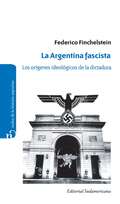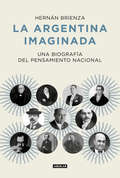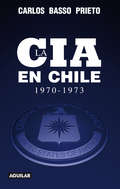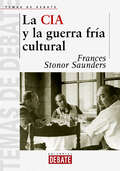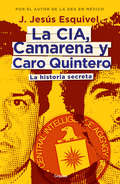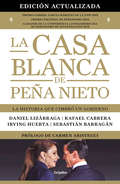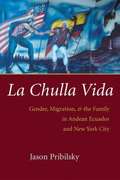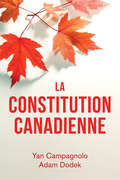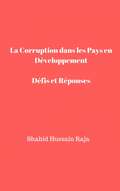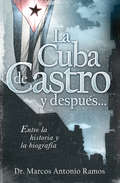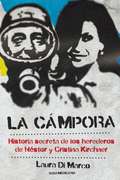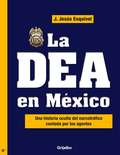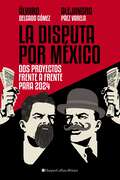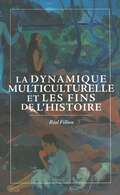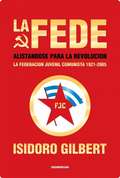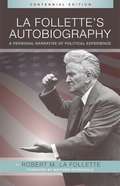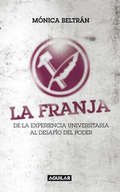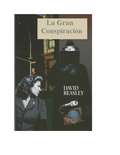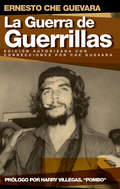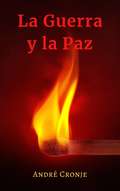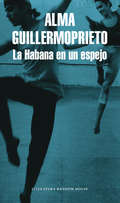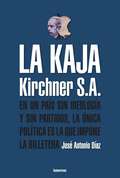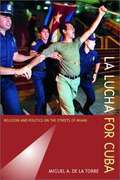- Table View
- List View
La Argentina fascista: Los orígenes ideológicos de la dictadura
by Federico FinchelsteinEste libro explora las razones históricas de esta pervivencia ideológicaen el siglo XX, desde la aparición de los primeros grupos de extremaderecha a la ideología de la dictadura procesista. Analiza asimismo lasrelaciones ideológicas entre peronismo y fascismo, los antecedentesnacionalistas de las organizaciones terroristas de extremaderecha de los 60 y 70 y la importancia del antisemitismo. ¿Qué fue la Argentina Fascista? ¿Qué importancia tuvo (y tiene) elfascismo en la historia patria? ¿Cuál fue la relación política eideológica entre fascismo, militarismo y religión católica? ¿Cuál fue elitinerario de la idea fascista a través del siglo pasado? ¿Cuáles sonlos orígenes ideológicos de la dictadura? Este libro analiza la historiade estas inquisiciones, desde sus comienzos con la reformulación delnacionalismo de forma autoritaria, xenófoba y «cristiana» hasta suliteralización en los campos de concentración de la última dictaduramilitar. Mussolini mismo tuvo grandes designios para el desarrollo delfascismo en Argentina. Los sectores autodenominados nacionalistasintentaron, a su manera, llevarlos a cabo durante las primeras décadasdel siglo pasado y las consecuencias de sus actos tiñen de pardo nuestrahistoria. Solo los grupos «nacionalistas» se definieron como fascistas,y sin embargo, la influencia de su fascismo se siente todavía en laArgentina.
La Argentina imaginada: Una biografía del pensamiento nacional
by Hernán BrienzaLos principales exponentes en 200 años de nacionalismo argentino. De Mariano Moreno y Juan Bautista Alberdi al Peronismo. Del nacionalismo de elite al socialismo nacional. Una mirada crítica sobre los imaginarios de Nación hasta la actualidad. "Quizás sea buena idea pensar al nacionalismo como una filosofía práctica, concreta, comunitaria, de valores marcados por la amistad", propone Hernán Brienza. Para ello reconstruye los pilares sobre los que se erigieron 200 años de imaginarios. Interesado en la erradicación de las formas represivas con las que ha sido pensado el nacimiento y el desarrollo del capitalismo argentino por una clase dominante, sugiere ver al Estado como un espacio de encuentro entre ciudadanos. "Los argentinos, salvo en contadas ocasiones, no hemos podido construir una Nación homogénea. Apenas hemos logrado diseñar un teatro de operaciones en el que protagonizamos un combate perpetuo entre nosotros mismos." Para revertir esta perversa dinámica social que mantiene al país preso de un virtual "empate hegemónico", el autor repasa vida y obra de escritores y políticos argentinos y analiza las circunstancias históricas internas y globales en las que surgieron y difundieron las ideas de Belgrano, Alberdi, Sarmiento, Gálvez, Ricardo Rojas, Lugones, Manuel Ugarte, Raúl Scalabrini Ortiz, Jauretche, Juan José Hernández Arregui y Juan Domingo Perón, entre otros Apasionante y revelador, este abordaje dinámico construye un fresco que parte de la literatura y la historia, para sistematizar un ideario tan amplio que abarca desde nociones republicanas y fascistas, pasando por la derecha y la izquierda, hasta el catolicismo, el liberalismo y la revolución.
La CIA en Chile 1970-1973
by Carlos Basso PrietoLa CIA en Chile es un libro que escudriña, más allá de los clichés, la real participación de la principal agencia de inteligencia norteamericana en nuestro país, cuyo clímax se vivió entre 1970 y 1973. Basado en documentación desclasificada, de diversos orígenes, la historia reporteada por Basso cuenta la importancia que Chile tuvo en medio del contexto de la Guerra Fría, los esfuerzos de inteligencia realizados por el KGB y las visiones contradictorias que existían en el seno de la misma CIA en dos momentos clave de la historia chilena: en los días previos a la asunción de Salvador Allende como Presidente de la República y en los inmediatamente anteriores a su derrocamiento. El libro incluye un anexo que relata la infiltración de la CIA en los grupos de ultraizquierda chilenos, incluso hasta después del retorno de la democracia.
La CIA y la guerra fría cultural
by Frances Stonor SaundersUna historia apasionante de un sistema de mecenazgo clandestino que no tiene precedentes en la historia contemporánea. Durante la guerra fría los escritores y los artistas se enfrentaron a un gran reto. En la esfera soviética, se esperaba que produjeran obras que exaltaran la militancia, la lucha y un optimismo sin límites. En Occidente, la libertad de expresión era la virtud más preciada de las democracias liberales. Pero esa libertad tenía un precio. Este libro documenta el extraordinario vigor de una campaña secreta en la que algunos de los defensores más ardientes de la libertad de pensamiento en Occidente (entre otros, George Orwell, Bertrand Russell, Jean-Paul Sartre y Arthur Schlesinger, Jr.) fueron, lo supieran o no, instrumentos del servicio secreto estadounidense. La crítica ha dicho...«Una obra fundamental de investigación»Edward W. Said «Saunders es espléndida al contar las ironías éticas y políticas de los proyectos culturales de la CIA.»San Francisco Chronicle «Una historia de intriga y traición, con escenas tan emocionantes como las de cualquier novela de Le Carré.»The Chronicle of Higher Education «Escrita con gran sentido del humor y comprensión de las circunstancias históricas.»Los Angeles Times Book Review «La mejor crónica de las actividades de la CIA entre 1947 y 1967.»The New York Times «Una contribución esencial para la comprensión de la posguerra.»The Wall Street Journal
La CIA, Camarena y Caro Quintero: La historia secreta
by J. Jesús EsquivelUn libro explosivo que aporta las claves definitivas para esclarecer un suceso que definió la historia del narcotráfico en México: el asesinato del agente de la DEA Enrique Kiki Camarena, en febrero de 1985. Se trata de un caso emblemático que pone en evidencia la forma en que el crimen organizado adquirió un poder prácticamente ilimitado en nuestro país, gracias a la complicidad urdida con policías, militares y funcionarios públicos, algunos de ellos aún en activo.Por medio de las confesiones de tres testigos que integraron las filas del entonces pujante cártel de Guadalajara, J. Jesús Esquivel ofrece un recuento inédito de las actividades criminales de capos de la talla de Ernesto Fonseca Carillo, Juan José Esparragoza, el Azul, Rafael Caro Quintero, señalados como coautores de la muerte de Camarena. Asimismo, da a conocer el testimonio completo del agente Héctor Berrellez -encargado de investigar el homicidio en la llamada Operación Leyenda-, quien confirma que la propia CIA habría estado detrás del crimen.En tal contexto, a lo largo de estas páginas se revelan datos, nombres y momentos que explican las perspectivas de la trágica relación entre México y Estados Unidos, atrapada en las telarañas de la corrupción por la producción, el tráfico y el consumo de drogas. Así, no obstante que la investigación nos cuenta las tribulaciones de una sociedad tan lejana como la de los años ochenta, remite y desentraña un presente de mayor tormento.
La Casa Blanca de Peña Nieto (edición actualizada): La historia que cimbró a un gobierno
by Rafael Cabrera Daniel Lizarraga Irving Huerta Sebastián BarragánNueva edición, actualizada y con capítulos nuevos: ¿qué pasó con la Casa Blanca, símbolo de la corrupción? Premio Gabriel García Márquez de la FNPI 2015 Premio Nacional De Periodismo 2014 Ganador de la Conferencia Latinoamericana de Periodismo de Investigación 2015 En 2015, este libro dejó en evidencia a Enrique Peña Nieto, a su esposa y a su gobierno. Y hoy, esta nueva edición relata qué pasó con la Casa Blanca, con los empresarios vinculados a ella y con la persecución desatada contra los periodistas que la investigaron. Aquí está el mejor retrato de un sexenio doloroso e impune, en el que el primer círculo de poder estuvo más interesado en hacer negocios con particulares que en gobernar. #El enojo [de Enrique Peña Nieto] por ser exhibido es algo que -a diferenciade lo que él recomienda a los padres de Ayotzinapa- no ha podido superar.# Carmen Aristegui
La Chulla Vida: Gender, Migration, and the Family in Andean Ecuador and New York City
by Jason PribilskyChronicling the experience of young Andean families as their lives extend between the Ecuadorian highlands and New York City, this book takes an in-depth look at transnational labor migration and gender identities. Jason Pribilsky offers an engrossing and sensitive account of the ways in which young men and women in these two locales navigate their lives, exploring the impact of gender, generation, and new forms of wealth in a single Andean community. transnational labor on the individuals and communities remain largely undocumented. The author draws on firsthand observations of everyday lives to explore issues of transnational marriages and material consumption in the region. Pribilsky presents a study that is both engaging and challenging, a vital contribution to the fields of Latin American studies and immigration studies.
La Constitution canadienne
by Adam Dodek Yan CampagnoloLa Constitution canadienne est un livre introductif sur la loi suprême du pays. La Constitution canadienne rend la loi suprême du pays plus facilement accessible aux lecteurs. Le livre comprend des commentaires visant à expliquer le sens des dispositions des lois constitutionnelles de 1867 et de 1982, un glossaire des termes clés, une brève histoire de la Constitution et une chronologie des événements marquants. De plus, La Constitution canadienne explique le fonctionnement de la Cour suprême du Canada et présente les acteurs et les enjeux liés aux plus importantes décisions constitutionnelles. Yan Campagnolo et Adam Dodek, tous deux professeurs de droit à l’Université d’Ottawa, fournissent un index de la Constitution canadienne et exposent des faits fascinants à propos de la Cour suprême du Canada et de la Constitution. Ce livre est un excellent ouvrage introductif à l’intention des personnes qui découvrent la Constitution du Canada pour la première fois ainsi qu’un ouvrage de référence utile tant pour les étudiants que les experts.
La Corruption dans Les Pays en Développement Défis et Réponses: Table of contents
by Shahid Hussain RajaLa corruption, qui se définit simplement comme l'abus d'un pouvoir confié à des fins privées, est un problème mondial et historique important qui impose des coûts politiques, économiques et environnementaux aux sociétés du monde entier. Outre son universalité, la corruption n'est pas un phénomène nouveau. Elle est aussi vieille que les êtres humains ont commencé à vivre ensemble et ont établi une certaine forme d'État pour gérer leurs affaires. En dépit de ce qui précède, nous devons admettre que la corruption est beaucoup plus répandue dans les pays en développement que dans les pays développés. Ce livre électronique est une tentative d'évaluer l'omniprésence de la corruption et des pratiques corrompues dans les pays en développement, d'en découvrir les causes et d'établir un cadre pour la minimiser, voire l'éradiquer totalement. Pour cela, j'ai proposé une série de recommandations dans les trois derniers chapitres avant la conclusion, c'est-à-dire les chapitres sept à neuf, du livre. Le chapitre 2 traite des perspectives de la corruption, y compris la question de l'élaboration d'une définition précise de la corruption et de ses différentes facettes. Le chapitre 3 porte sur les causes et les conditions propices à la corruption. Le chapitre 4 de l'ouvrage explique la manière dont la corruption est mesurée dans un pays afin de classer les pays en deux catégories : les plus corrompus et les moins corrompus. Il souligne également les limites de ces méthodes afin d'avoir une perspective adéquate et une comparaison mondiale, tandis que le chapitre 5 énumère les coûts - sociaux, économiques et politiques - de la corruption généralisée dans le pays. Il démonte l'idée que la corruption sert de monnaie d'échange dans un pays en développement pour accélérer le processus de modernisation. Une absurdité totale.
La Cuba de Castro y después...: Entre la historia y la biografía
by Marcos Antonio Ramos¿Dictador o libertador? ¿Genio caritativo o tirano opresor? El doctor Marcos Antonio Ramos se enfoca de manera equilibrada y analiza al líder cubano, Fidel Castro, y el contexto histórico que rodea su influencia. Ramos escribe desde una perspectiva privilegiada dentro y fuera de Cuba y presenta a un hombre que ha sido en momentos odiado, en momentos querido, ignorado o aceptado por sus contemporáneos alrededor del mundo. Desde su ascenso al poder, sus inicios en la vida política, la influencia recíproca del Che Guevara, y la influencia que tuvo Castro sobre gran parte del desarrollo de Latinoamérica, La Cuba de Castro y después... incluye temas como:1. La era de la Guerra Fría2. Los varios éxodos de la población 3. El aislamiento4. El posicionamiento actual y la influencia de Castro en la formación de los líderes actuales de Latinoamérica5. El lugar de Castro en la historia6. Una Cuba sin Castro y su función y posición en el futuro de Latinoamérica
La Cámpora: Historia secreta de los herederos de Néstor y Cristina Kirchner
by Laura Di MarcoOrigen e historia de la agrupación política juvenil que nació como apoyoa los gobiernos del matrimonio Kirchner. Este libro devela quiénes son yqué función cumplen en el mapa del poder cada uno de sus principalesintegrantes. Héctor Cámpora asumió su brevísima y leal presidencia el 25 de mayo de1973, exactamente treinta años antes que Néstor Kirchner. El 14 dediciembre de 2010 fue el último evento público de Kirchner con vida. Enesa ocasión, la juventud K se reunió en el Luna Park para apoyar a suspadres políticos. Aquel día Kirchner no habló, quizás tampoco debíahaber estado allí. Hacía apenas cuatro días se había sometido a unaoperación. Esa noche se hizo pública por primera vez la imagen delNestornauta. Todas estas fechas y nombres no son casuales y pasarán a lahistoria porque forman parte de la creación de La Cámpora, la mayoragrupación política juvenil de los últimos tiempos.Aquella noche en el Luna Park estaban, entre otros, Mariano Recalde,Eduardo de Pedro (alias Wado), Andrés «el Cuervo» Larroque, JuanCabandié y Mayra Mendoza. Parte de lo que hoy es la cúpula de LaCámpora. Todos ellos son ahora funcionarios del gobierno o deimportantes empresas relacionadas con el Estado. Cristina Kirchner y suhijo Máximo cumplen el mandato de Néstor de trazar un puentegeneracional para sostener el poder político con la ayuda de losjóvenes.
La DEA en México: Una historia oculta del narcotráfico contada por los agentes
by J. Jesús EsquivelEl combate al narcotráfico en México desde el punto de vista de los agentes de la Agencia Antidrogas de Estados Unidos, con los testimonios de varios de ellos que han trabajado en nuestro país en diversos momentos. Un libro revelador e impactante que detalla por primera vez la forma en que la DEA ha intervenido en México desde su creación en 1973, y cómo lo sigue haciendo y lo hará en el futuro porque llegó para no irse nunca. Hasta hoy no se había escrito una investigación como ésta. Se sospechaba que la DEA operaba en el territorio nacional con entera libertad, pero se carecía de evidencias como las que aquí presenta J. Jesús Esquivel -corresponsal en Washington del semanario Proceso- a través de los testimonios directos de agentes antinarcóticos. Ellos nos cuentan cómo operan, cuáles son sus métodos de investigación, cómo se allegan informantes y cuál es la relación que establecen con las autoridades, las fuerzas armadas y las policías nacionales, así como con narcotraficantes y otras agencias norteamericanas. Entre otras valiosas revelaciones, La DEA en México documenta cómo los agentes estadounidenses recorren el país ilegalmente armados, algo que el gobierno mexicano ha ocultado, al mismo tiempo que contiene referencias abiertas y directas sobre la corrupción imperante entre todos los involucrados nacionales en el combate a las drogas. Por añadidura, se da a conocer un documento interno de la DEA que describe paso a paso la investigación que en 2005 condujo al descubrimiento de narcofosas en Ciudad Juárez, donde sale a la luz cómo el Departamento de Justicia de Estados Unidos protegió a un informante que perpetró un asesinato mientras colaboraba con esa misma dependencia. Finalmente, siempre desde la óptica de los agentes extranjeros, se reconstruye la lucha contra las drogas desde los años setenta y se relata la historia de los principales capos, como Amado Carrillo Fuentes, Juan García Ábrego y, por supuesto, El Chapo Guzmán, a quien "no se atrapa porque el gobierno mexicano no quiere hacerlo", según sostienen los entrevistados.
La Disputa por México: Dos proyectos, frente a frente, para 2024
by Alejandro Páez Varela Álvaro Delgado GómezMéxico vive una guerra interna por el control de la Nación. Dos polos, dos bandos, dos ejércitos con dos ideas distintas de República buscan controlar su destino. Durante 40 años, el país estuvo montado sobre los rieles del neoliberalismo; 40 años en los que se acentuaron la pobreza y la desigualdad, mientras se consolidaba el control de una élite sobre las políticas públicas, las instituciones, la economía, la educación de las masas y hasta sobre los órganos autónomos. Esa élite tomó decisiones que impactaron en la vida de millones de mexicanos. La élite, sin embargo, perdió el poder hegemónico. Una fuerza surgida de la izquierda, abiertamente opositora al neoliberalismo –pero aún metida en esos zapatos–, tomó el control federal en 2018. No ha asumido del todo las riendas de la economía, de las políticas públicas o de las instituciones de la Nación y enfrenta fuertes resistencias del grupo que dominó al país.
La Dynamique multiculturelle et les fins de l’histoire (Philosophica)
by Réal FillionDans La dynamique multiculturelle et les fins de l'histoire, Réal Fillion propose une lecture originale de textes clés portant sur la philosophie de l'histoire signés par Kant, Hegel et Marx, et démontre que ces textes demeurent pertinents aujourd'hui pour comprendre l'histoire. Il présente les thèses de ces trois auteurs à propos de la dynamique et des fins de l'histoire afin de répondre à la question suivante : où allons-nous? Appuyant sa réponse sur le double constat que le monde devient de plus en plus multiculturel et de plus en plus unifié, Fillion réaffirme la tâche de la philosophie spéculative de l'histoire telle que l'avait comprise la philosophie allemande : il s'agit de comprendre et d'expliciter le processus historique en tant que tout en évolution. De sa compréhension de la dynamique du passé et du présent telle que présentée par Kant, Hegel et Marx, l'auteur considère plusieurs courants récents de la pensée sociale et politique afin de jeter un éclairage différent sur les événements actuels et les avenirs possibles. Il présente ainsi une réponse à la fois riche et actuelle à la question : où le monde actuel s'en va-t-il ? Publié en français
La Fede: Alistándose para la revolución. La federación juvenil comunista 1921-2005
by Isidoro GilbertLa Fede llegó a ser exceptuando a la JP de los setenta la mayororganización política de jóvenes de la Argentina. No es exagerado decirque casi toda la Argentina relevante parece haber estado vinculada a LaFede. Esta investigación cuenta todo lo que es necesario sabersobre la vida de esta institución polémica y decisiva. Su rigurosidadexcede por completo el contenido de otros libros del género. Estamosante un trabajo que por momentos parece una gran novela y por otros ungran fresco. En la primera, los acontecimientos se ordenan paraofrecernos una historia coherente y completa, no exenta de episodios yanécdotas cómicas y trágicas; en el último, la lucidez del escritorparece mostrar en simultáneo una actividad y una emblemática que abarcannoventa años de cronología nacional. Todavía hoy hay sombras en relacióna esta organización que llegó a contar con más de cien mil afiliados.Gilbert echa luz sobre la fecha y la ocasión de su verdadera fundación;recupera para la memoria histórica a sus dirigentes más destacados(muchos de ellos sancionados y apartados a la fuerza de la historia y dela memoria colectiva); revela detalles sobre la preparación militar delos comunistas argentinos en Cuba, en los sesenta, bajo la dirección delChe. Muchos militantes de La Fede fueron líderes de las organizacionesarmadas, sobre todo de las FAR. Por La Fede pasaron miles de jóvenes quemás tarde se descollaron en la gran política o se convirtieron ennotables figuras de la ciencia, la justicia, el arte, o de la dirigenciasindical peronista. Rescata el folklore y las reglas de la organización,su cultura, su manera de influir en miles de jóvenes que pasaron por susfilas, cómo fue montada su estructura financiera, su aparato de prensa.La Fede es un libro excepcional y único para entender la historia denuestro país. E Isidoro Gilbert es la única persona que puede recuperaresta historia y contarla por primera vez.
La Follette's Autobiography
by Robert M. La FolletteWritten in lucid, vigorous prose, "La Follette""'s Autobiography" is the famous Wisconsin senator's own account of his political life and philosophy. Both memoir and a history of the Progressive cause in the United States, it charts La Follette's formative years in politics, his attempts to abolish entrenched, ruthless state and corporate influences, and his embattled efforts to advance Progressive policies as Wisconsin governor and U. S. senator. With a new foreword by Matthew Rothschild, editor of "The Progressive"--the magazine that La Follette himself founded--the "Autobiography" remains a powerful reminder of the legacies of Progressivism and reform and the enduring voice of the man who fought for them.
La Franja. De la experiencia universitaria al desafío del poder
by Mónica BeltránEn estos días de florecimiento de la militancia política juvenil, La Franja. De la experiencia universitaria al desafío del poder es una obra de lectura ineludible para conocer la historia de una corriente con raíces casi centenarias. Franja Morada es una de las escasas corrientes políticas juveniles que han perdurado a lo largo de décadas. Heredera de la Reforma de 1918, sobrevivió a persecuciones, dictaduras, purgas, defecciones, presiones, alianzas y rupturas. Vanguardia del activismo político en el retorno de la democracia en 1983, fue puntal del montaje de la candidatura presidencial de Raúl Alfonsín, defensora inclaudicable de su gestión, y activa constructora de la Alianza que llevó a Fernando de la Rúa al gobierno. Varios de los jóvenes franjistas más conspicuos o cuparon puestos de gobierno en ambos gobiernos, y muchos diputados, senadores e intendentes de la actualidad, recibieron su bautismo militante en la Franja. Franja Morada conduce la Federación Universitaria Argentina desde los setenta hasta el presente. Esa fuerte inserción entre el estudiantado es, seguramente, una de las razones que explican su supervivencia tras las dos bancarrotas presidenciales del radicalismo.
La Gran Conspiración; Un Misterio de la Biblioteca de Nueva York
by David Richard BeasleyRudyard Mack, detective de la Biblioteca de Nueva York, debe determinar si su novia, Arbuthnot Vine, presidente del Sindicato de Bibliotecas, fue la víctima intencional de un apuñalamiento. Arbie puede haber sido atacada porque encabezará una marcha en el Ayuntamiento para protestar por los despidos. Cuando es secuestrada, Mack es llevado al mundo turbio de la política de Nueva York, al corazón de una misteriosa conspiración.
La Guerra de Guerrillas
by Ernesto Che GuevaraA bestselling Che classic for decades, this is Che Guevara's own incisive analysis of the Cuban revolution-a text studied by his admirers and adversaries alike. Here he explains how a small, dedicated group grew in strength and with the support of the Cuban people was able to defeat a dictator's army.
La Guerra y La Paz: Paz Para El Mundo
by André CronjeLA GUERRA Y LA PAZ Presenta más de 500 citas sobre la belleza de la paz mundial, la paz interior y la paz con Dios en medio de las cenizas de la guerra, los puentes quemados y las promesas incumplidas.
La Habana en un espejo
by Alma GuillermoprietoInscrita en la tradición de la obra de Joan Didion, V.S. Naipaul y Ryszard Kapuscinski, La Habana en un espejo aborda un tema político y social a través de la crónica, género por el que Alma Guillermoprieto, premiada en varias ocasiones, ha pasado a formar parte de los mejores escritores que tratan de cerca la situación actual de América Latina. En La Habana en un espejo Alma Guillermoprieto reconstruye una de las épocas más difíciles de su vida; formada en las mejores escuelas de baile de Nueva York, a los veinte años viaja a La Habana para impartir clases en la Escuela Nacional de Danza. La confrontación con el régimen castrista y el idealismo del pueblo cubano sacuden la conciencia política de la narradora, todo ello en una época en la que la revolución parecía ser la única solución a muchos problemas. La Habana en un espejo es la historia de la reivindicación de esta artista y una reflexión acerca de un régimen, y el resultado es un relato cargado de pasión y de ira en el que la autora consigue desmenuzar sus recuerdos con un pulso ágil y minucioso. Reseñas:«Una de las crónicas más astutas y elocuentes de la América Latina contemporánea. [...] Guillermoprieto hace una descripción íntima y conmovedora, dura e inteligente de la vida cotidiana durante la revolución.»San Francisco Chronicle «Un placer de lectura, repleta de humanidad, astucia, curiosidad y conocimiento.»The New York Times Book Review «La Habana en un espejo está escrita con elegancia. Captura el espíritu y los ritmos de Cuba durante un período de cambio dramático y agitación política.»Tucson Citizen
La Historia del Rey Arturo: Cómo Arturo se Volvió Rey
by Stuart Glendover¿Quién habría podido imaginar que un problema conyugal podría dar lugar a la fascinante historia del Rey Arturo? Pero esto es lo que ocurrió. El rey de Britania Uther Pendragón quería casarse con la bella Igraine de Cornualles para que se convirtiera en su reina. Desgraciadamente, Igraine no estaba a favor de este matrimonio, por lo que Uther pidió ayuda a un mago llamado Merlín que resolvió el problema, y Uther e Igraine se casaron felizmente. Para recompensar a Merlín, el rey prometió que le daría su primer hijo a Merlín para que lo criara. Y así sucedió; cuando nació el hijo, Merlín cogió al bebé y lo bautizó con el nombre de Arturo. Al cabo de unos años, el rey Uther enfermó gravemente y, antes de morir, dijo que su hijo Arturo sería el heredero al trono. Ningún noble ni siquiera sabía de la existencia de un heredero, por lo que los nobles que estaban presentes con unos pocos miles de seguidores estaban listos para reclamar la corona. Con la ayuda de una Espada Mística, Arturo pudo convencer a todos los plebeyos y nobles de que estaba destinado a heredar el reino. Finalmente, fue nombrado caballero y, tras ello, coronado rey de aquellas tierras.
La Kaja: Kirchner S.A
by José Antonio Diaz«"La Kaja" es un libro devastador. Desnuda a un régimen y lo hace conlas herramientas implacables de la información y la razón». PepeEliaschev Desde el día en que Néstor Carlos Kirchner llegó a la presidencia,utilizó la distribución de fondos, la oferta de cargos y laparticipación en la asignación de obras públicas como argumentos paraatraer a gobernadores, legisladores, intendentes, sindicalistas ypiqueteros. Soy porque tengo: esa es la marca de la gestión. La Kaja,así, con K, es el neologismo que define un modo de acumulación derecursos dotado del poder simbólico de la política. Es la base materialdel poder. La fuente de subsistencia. Este libro revela el modo en quela Kaja intimida y doblega voluntades, construye ideologías, paga elmito de la revolución y multiplica las operaciones de perpetuidad.«En estas páginas se ilumina la radiografía más certera y profunda de loque la historia dirá sobre el kirchnerismo». Alfredo Leuco
La Lucha for Cuba: Religion and Politics on the Streets of Miami
by Miguel A. De La TorreThis book examines the fiery interplay of religion and politics among Miami's Cuban exile community.
